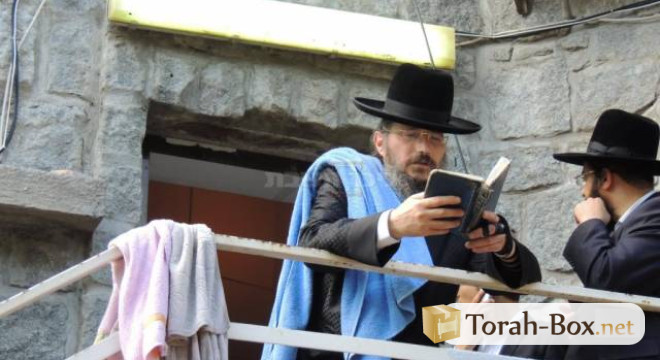
Rosh Hashanah
What Do We Do Erev Rosh Hashanah?
What are the laws and customs to be carried out Erev (day before) Rosh Hashanah?
Cancellation of Vows
It is customary to cancel one's vows on Erev Rosh Hashanah. It is necessary to do this in front of ten men who know the Jewish laws as stipulated in the Shulchan Aruch.
Pilgrimage of the Righteous
On Erev Rosh Hashanah, some have the custom to go to the graves of the righteous, to ask them to implore G-d for mercy on our behalf. However, it is forbidden for Kohanim to go to the tombs of the Righteous, even if they are buried separately from the dead people.
Cut One's Hair
It is commonly accepted that a person (even an important one), does not dress in excessively beautiful clothes when he goes to court, so as not to distinguish himself from others. He will rather dress in normal clothes, which will more easily arouse the mercy of the judge. We are however confident in the goodness of Hashem, that He will allow us to emerge victorious from His judgment.
This is why we cut our hair and dress in beautiful clothes to honor such a day. In this way, we are showing our trust in Hashem, that He will decree a prosperous and happy life for us. Nevertheless, one should not wear overly beautiful clothes so that one remembers the gravity and the importance of this day. Even King David said [Tehillim 119.120]: "My flesh shudders with the terror You inspire, and I dread Your judgments". How much more so in our case.
The Mikvah (Ritual Bath)
It is an important custom to immerse oneself in a mikvah, the day before Rosh Hashanah in order to pray on the day of judgment in a pure and holy state. Likewise, he who can immerse himself every day before Shabbat, draws blessings upon himself. In addition, one who is sick and cannot dip himself in a mikvah, should be in the shower, with water flowing on him for the time that it takes for nine kav of water to flow (twelve and a half litres). There is no difference if the water is cold or hot. As for people who are well, they should pay particular attention to immerse themselves in a mikvah.
It is obvious that this alternative cannot, in any case, serve in the case of a woman who has to go to the mikvah. As the Rambam writes: "Even if she pours all the waters of the world on her, they will be of no use to her, but she will have to immerse herself in a mikvah designated for this purpose. "
Preparing a Candle that Should Stay Alight
It is forbidden to light a new fire on Yom tov, from a match, a lighter, etc. On the other hand, it is permissible to light from a fire that was lit before the festival began. Therefore, we must take care, before the festival begins, to light a candle that can burn for forty-eight hours (the two days of Yom Tov), in order to use this existing flame, in case we wish to cook and to light the gas. This is called "lighting a fire from another fire. "
Lighting Candles
It is best for women to light the candles of Yom Tov before sunset, as she does when she lights her Shabbat candles. However, those women who light the candles of Yom Tov, from an existing fire, just before Kiddush may do so according to some opinions.
The Moment of Reciting the Blessing
Before lighting the candles, the woman should recite: "[...] Lehadlik ner shel Yom Tov",and then she should light the candles. Although on Shabbat, the majority of Ashkenazi women are accustomed to lighting the candles and then to recite the blessing, on Yom Tov, they first have to recite the blessing and then light. [Mishnah Berurah 263.27]
Blessing on Time "Shehecheyanu"
A woman at home should not say this blessing at the moment of candle lighting, since in any case it will be recited during Kiddush of Yom Tov. Those who do say it will experience a problem as they are causing an interruption between the blessing on the candles and the actual lighting. Therefore, one should gently tell those who make the blessing "Shehecheyanu" at the time of lighting, to abstain from pursuing this custom. However, those who recite this blessing at candle lighting, must be careful not to respond to it at Kiddush, because of the risk of interruption between the blessing on the wine and the moment of drinking. If they reply “Amen”, they need not drink the wine, because in any case, there is no obligation to taste it.
Torah-Box.net Account
To access the entire Torah-Box.net website, sign up for free in less than a minute.
Weekly Parsha
 Candle Lighting - New York
Candle Lighting - New York
Friday February 20th, 2026 at 17:18 *Shabbat ends at 18:20 *
change my location
* Times given as an indication, check the times of your community










